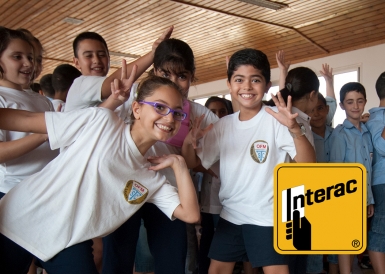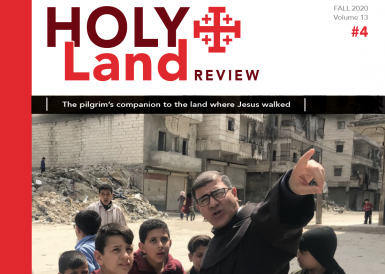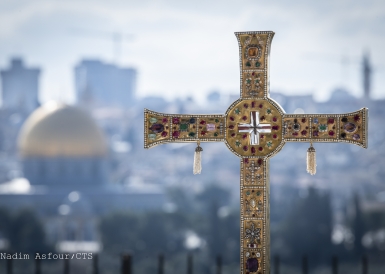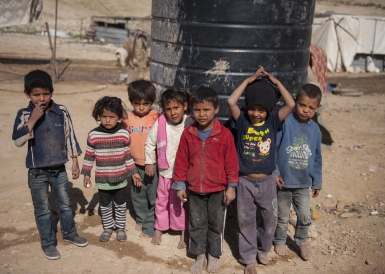
© Andrea Krogmann
The Latin Patriarchate is multiplying its efforts to help the Christians of the diocese. All the teams are mobilized to listen to the requests and to try to respond to them. We met with Bishop William Shomali, Patriarchal Vicar for Jerusalem and the West Bank, to get news of the community entrusted to him.
Interview by Andrea Krogmann
Bishop Shomali, the world in the Holy Land has changed a lot since the Hamas attack on October 7 and the war in Gaza. What are the consequences for Palestinian Christians?
Since October 7, Christians have been living in uncertainty more than ever. About 40% of Christians in Jerusalem and 1/3 of Christians in Palestine work directly or indirectly in tourism. They are guides, tourist bus drivers, employees in hotels etc. Covid had dealt a blow to the sector. No sooner had they recovered than October 7 arrived. Since then, there have been no more pilgrims, and these Christians are suffering from the loss of their jobs or from a dramatic drop in their income. Based on studies and statistics, the Latin Patriarchate estimates that in the tourism sector alone, 3,000 Christians have lost their jobs, not counting hundreds who worked in Israeli construction and other sectors who have also lost their jobs. So Christians are in an unsure position, even if the situation of Christians in Jerusalem is better than the situation in Palestine or Gaza.
Why is that?
Christians in Jerusalem benefit from the health insurance system and receive unemployment if they were in tourism. Christians in the West Bank feel imprisoned. Not only can they not travel to Jerusalem, but they also face many difficulties in moving around within the West Bank. Those who had work permits in Israel can no longer leave because, when their permit is not suspended, the checkpoints are closed. It is an additional suffering added to others, such as the economic situation and the psychological burden.
In some areas, the population fears attacks by settlers. In Taybeh, for example, settlers attacked villagers during the olive harvest. Eventually, the police came to push them back, but they could have caused a disaster like in other Palestinian villages.
Has settler violence intensified since October 7?
Yes, although this is more visible in the northern part of the West Bank, where there are fewer Christians. The colonists were increasingly armed. They have been encouraged in this by members of the government such as the Israeli Minister of National Security, Itamar Ben-Gvir. All this makes the future dark and some Christians are thinking of leaving.
Do you have any idea of the number of candidates for emigration?
We don't have exact statistics on those who have emigrated since October. But we know that families have left. At the same time, there is a big difference between wanting to leave – which is shared by many Christians in the West Bank – and being able to leave. It is expensive. In addition, Palestinian Christians have a strong patriotic conscience.
Is the idea of a Palestinian state alongside an Israeli state, the famous two-state solution, still relevant after October 7?
The voice of Palestinian Christians is unanimous in favour of two states. One thing is certain, it is impossible to leave the situation as it is. It is the absence of a solution that most encourages Islamic fundamentalism. Hamas would not have done what it did without the impasse we are in.
Do you also see a radicalization of Christians?
No, not in Palestine! Let's take the example of Gaza: no Christian in Gaza is with Hamas!

Let's talk about the Christians of Gaza...
There were 1,017 Christians in Gaza before the war. They decided to stay in Gaza City and did not obey evacuation orders, because they felt they were safer within the walls of their churches than in the south of the Gaza Strip. Two-thirds took refuge in the Latin parish complex and 1/3 in the Greek Orthodox parish. They are sorely lacking electricity, water and food. These days, fortunately, they have been able to buy bags of flour. They also received frozen chickens, which are difficult to cook because they have no electricity or gas. The majority of Christians lost their homes, which were destroyed. They live in our schools. We will not be able to resume school activities until people have rebuilt their apartments. Currently, we continue to pay the teachers of the two Latin schools. We admire these Gazans who have extraordinary resistance, but the situation is horrible. All of them aspire to leave.
That is to say, Christian families are leaving?
Several have left. Dual nationals. But Egypt charges between $7,000 and $10,000 per person to get out. Some have managed to pay, others are collecting money. The Patriarchate, with the help of Jordan, has managed to get several young Christians to leave who are studying at our Catholic University in Madaba. They are happy to live in Jordan until the end of their studies, but they don't know what their fate will be after that.
What does the Church think about the emigration of Christians from Gaza?
The church will respect the decisions taken. We will continue to help those who remain. We will not have the means to help those who leave. An American association has offered to help Christians leave via the humanitarian bridge set up with Cyprus. The Patriarchate did not accept this because it is impossible to leave Gaza without coordination with the Israeli army. This would be perceived as a form of collaboration with the military, and would endanger all our Christians throughout the Middle East.
Do you see any changes in the coexistence between Muslims and Christians in the West Bank or Jerusalem since the war?
Not so much, because everyone was moved to compassion for those in Gaza, especially since the difficulties were the same for Christians and Muslims. We are in the same situation.

And what are the relations like for the Christians of Jerusalem with the Jews?
A distinction must be made between politics and interreligious dialogue. At the interreligious level, there is dialogue between the Churches and the Jews of the world. This dialogue has not stopped, but because of the political situation, it is very limited. Those who knew each other before stay in touch. Personally, I recently had a group of Canadian Jews, and we had a very good exchange. We believe that dialogue is beneficial for all, even if the visit of the heads of the Churches to the Israeli president in December provoked very harsh reactions from some Palestinian Christians.
What do your Christians think of the role of the Church in this war?
There is a diversity of approaches. Some believe that the churches are too neutral or too pro-Israel and want them to be more committed to the Palestinians. In particular, Palestinian Christian intellectuals are very critical. Others say that churches should not get involved in politics and that their role is above all to support humanitarian aspects.
An approach adopted by the Latin Patriarchate...
Yes. The Patriarch's appeal after October 7 was well received, thanks to which we were able to establish a humanitarian aid program. With this program, we help sick people get their medications, subsidize medical operations, scholarships, rent, and help families in financial need. With the Saint-Yves company, we are working to improve the situation at the checkpoints. The churches have managed to increase the quotas for permits to enter Israel for their workers from Palestine, even if this does not satisfy all the demands. We know that our aid is insufficient to compensate for the loss of income, but keeps families out of poverty, waiting for better days.
What future do you see for Palestinian Christians?
I predict that the decline in the percentage of Palestinian Christians will continue. However, their current number will be maintained. I am certain that even in a thousand years there will be as many Christians around the Holy Places. But their percentage will then be derisory. However, the Lord can prepare surprises for us. For the time being, we hope – and pray for – a political solution to the current conflict and for the pilgrims to be able to return. Our Christians have always worked in the hospitality sector. This is one of the reasons for their survival. While pilgrims cannot conceive of the Holy Land without Palestinian Christians, the latter cannot conceive of their survival without the influx of millions of pilgrims.



